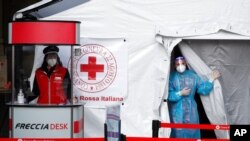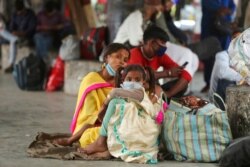Italian Prime Minister Mario Draghi on Friday announced that the country would begin easing some of its stricter COVID-19 restrictions April 26.
At a Rome news conference, Draghi said that a priority would be given to opening outdoor establishments such as restaurants and that all schools would reopen.
The prime minister expressed "cautious optimism" about the nation's COVID-19 situation, saying there had been modest improvement. But he said government was taking a risk in that reopening would be based on the premise that people continue to wear masks and maintain social distancing.
The announcement came the same day the World Health Organization expressed concern about the continued global increase in new COVID-19 cases.
At his regular Friday news briefing, WHO Director-General Tedros Adhanom Ghebreyesus said the weekly number of new cases had more than doubled over the past two months, approaching the highest infection rate seen since the pandemic began.
He said the infection numbers began to rise steadily in February, following six consecutive weeks of decline.
Surge in India
On similar note, health officials in India said they counted more than 200,000 new COVID-19 cases Thursday, an all-time daily high for the South Asian nation.
The surge in cases has India scrambling to find hospital beds and oxygen. The escalating tally has also forced India, a major vaccine producer, to delay global shipments of COVID-19 vaccines and instead redirect them for use at home.
Some public health officials also have said they believe a Hindu festival, during which hundreds of worshippers bathed in the Ganges, and recent political rallies may have contributed to the surge.
Meanwhile, the U.S. Centers for Disease Control and Prevention reported Thursday that more than 30% of U.S. adults — about 78.5 million — were fully vaccinated for COVID-19. The CDC said 48% of adults had received at least one dose of the vaccine, as had 80% of seniors, who are the most vulnerable to the virus. The agency said 64% of seniors were fully vaccinated.
The CDC also reported about 5,800 so-called breakthrough cases of people who had been vaccinated but still contracted the virus.
In a statement, the agency said, "All of the available vaccines have been proven effective at preventing severe illness, hospitalizations and deaths. However, [as] with other vaccines, we expect thousands of vaccine breakthrough cases will occur, even though the vaccine is working as expected."

